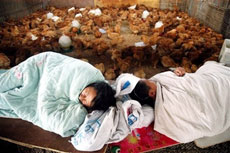Bird flu fears focus on Indonesia
 Many people still do not understand the risks of living close to birds |
The news that Indonesia is now the country worst affected by bird flu will come as little surprise to many analysts.
While other parts of Asia - such as Hong Kong, mainland China and Vietnam - have been able to tackle the disease, the death toll in Indonesia continues to rise.
Infected poultry flocks have now been found in 27 of the country's 33 provinces, and even the 44 recorded human fatalities have been spread right across the country.
"We're doing our best to try to stop this disease, but it seems that our best just isn't good enough," said Bayu Krishnamurti, secretary of a national committee set up by the government to fight bird flu.
The reason this failure matters was highlighted earlier this year when seven members of the same family all died of the disease - one of the few suspected human-to-human cases to have been recorded so far.
On this occasion, the lethal H5N1 virus appears not to have mutated into a form more easily transmissible between people - a step which could lead to a global human pandemic.
But the incident raised fears that such a mutation could one day take place, and brought the spotlight on Indonesia as the place where it could happen.
Lack of co-ordination
Despite a plethora of negative headlines, the Indonesian authorities are slowly gaining some ground in their battle against bird flu.
 |  Until the animal situation is under control, we'll continue to see human cases Until the animal situation is under control, we'll continue to see human cases  |
According to Bayu Krishnamurti, the situation was once so bad that four million birds were dying every month, but now fewer than 200,000 are succumbing to the virus.
Dick Thompson, a spokesman for the World Health Organization, added that Indonesia had become adept at diagnosing human cases.
But he said that however good the provision for humans was, the disease remained primarily an avian one, and people would continue to contract bird flu as long as it was endemic in poultry.
"Until the animal situation is under control, we'll continue to see human cases," Mr Thompson said.
But that is exactly where the problem lies. How do you ensure that a population of 220 million people, living on 18,000 islands, gets adequate information about prevention measures, and then implements it?
Despite awareness campaigns in the media and even door-to-door visits in some areas, many Indonesians remain oblivious to the dangers of being in contact with diseased birds, and aware of the need to inform the authorities and implement a cull.
"Some of the people who come here still know nothing about how they contracted bird flu," said Santoso Suroso, the director of the Sulianti Suroso Infectious Diseases Hospital in Jakarta, where many patients are taken.
People across this vast archipelago still continue to live in close quarters with birds, he said. Many have chickens in their backyards, and keep caged birds as pets.
| QUICK GUIDE 
|
"We're trying to advise them to change, of course, but it's not easy to change a cultural practice. It takes a long time," said Mr Suroso.
As well as getting the message across, Indonesia also struggles with making that message a co-ordinated one.
Due to its many different separatist struggles and culturally distinct populations, the country has devolved a lot of power away from the central government to the provinces. While this might be the best solution politically, it makes the job of mounting a country-wide disease control programme extremely difficult.
In late July, Vice-President Jusuf Kalla acknowledged that culling orders sent from Jakarta were sometimes simply ignored by the local authorities, who were trying to avoid paying compensation. "This is dangerous to all of us," Mr Kalla said.
"We have a situation where each province - in fact each district - has its own veterinary service. That's been one of our biggest concerns," added Peter Roeder, a disease control expert with the UN Food and Agriculture Organization (FAO).
Worldwide concern
Indonesia has been criticised internationally for not taking enough concerted action in the fight against bird flu.
 Indonesian deaths are rising despite government efforts |
Unlike Thailand and Vietnam, which initiated aggressive culling programmes, at least in the initial stages of the outbreak, Indonesia has been reluctant to kill huge swathes of birds.
But Mr Roeder, who is part of an FAO team working with the Jakarta government to combat bird flu, believes that a lot of this blame is unfair.
"Widespread culling is not the right approach. It would alienate the communities you're trying to help, and the cost is prohibitive. It's better to cull infected birds and those in the immediate vicinity, then concentrate on vaccination," he said.
"It's having a systematic method that's key - you need to implement it across the board."
Mr Roeder estimates that $50m is needed over the next three years to develop such a programme. "Clearing this up will take a long time," he said.
But the international community has been slow to come up with the funds, and Indonesian officials readily admit they need more outside help.
"We've faced many other disasters recently, like the tsunami and the earthquake in Yogyakarta. We're already being squeezed in terms of resources," said Bayu Krishnamurti.
While the world may criticise Indonesia for its handling of bird flu, the fact remains that unless the funds are available to tackle this disease head-on, it could well spread beyond the country's borders.
As Mr Krishnamurti succinctly put it: "Actually, this is not just Indonesia's problem."














